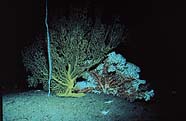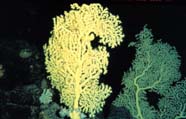Recent studies have indicated that deep water coral structures occur more frequently than previously believed, and they are rich in biota. For example, Norwegian studies have identified 300 species in deep water coral structures in areas off Norwegian coasts.
Stemming from the debate surrounding the analogy made between coral reefs and rainforests, participants discussed how to define coral assemblages that live in deep and cool water. Are they reefs in the true sense of the word? Or would a different definition be more accurate? The discussion expanded to include other coral-related terminology. |

Soft coral species such as these are found in both cold, deep waters and shallow, warm waters. These corals reside off the coast of Hawaii.
|
|
|
A Discussion of Terminology
Several participants admitted that they were uncertain about how to correctly define deep/cool water corals. One participant posited that to interpret all coral masses as reefs would be misrepresentative. Another noted that he commonly used the term “grove” to describe deep/cool water corals, but asked if anyone knew of a widely accepted official definition of corals that would differentiate between tropical and deep/cool coral assemblages.
 |
|
Deep sea submersibles (DSVs) can be used to study deep or cold water reefs. Here, a DSV manipulator arm reaches for a soft coral. |
|
|
His question prompted several responses. One participant quoted a general definition of a reef as a “structure on which ships can run aground; a chain of rocks or ridge of sand at or near the surface of water that can be a hazardous obstruction.” The definition leaves no room for deep/cool water corals, according to the participant.
Another participant further differentiated deep/cool water corals from coral reefs by noting that reefs are structures built by hermatypic (reef-building) corals and other associated organisms, and they usually contain zooxanthellae. In contrast, deep/cool water corals generally do not contain zooxanthellae and are regarded as ahermatypic.
One participant further explained that in most cases, a coral is either zooxanthellate or azooxanthellate. However, a coral is not inherently hermatypic or ahermatypic. Rather, environmental factors determine whether coral can accrete limestone faster than it is eroded or covered. For example,
Montastrea spp. occurs in both the Caribbean and off the coast of Florida. Environmental factors allow it to be hermatypic in the Caribbean but not on the West Florida Shelf, the participant stated.
 |
|
Although little light can reach depths below 500 ft., this gold coral grows on pillow lava in depths of more than 1000 ft. off the coast of Hawaii. |
|
|
The participant concluded by touching on the practical implications of the definition. The distinction made between hermatypic and ahermatypic conditions affects management decisions made in conservation efforts. For example, environmental conditions that support the survival of
Montastrea could differ significantly from conditions that would support reef development. Managers should consider these circumstances before making conservation decisions.
Top

